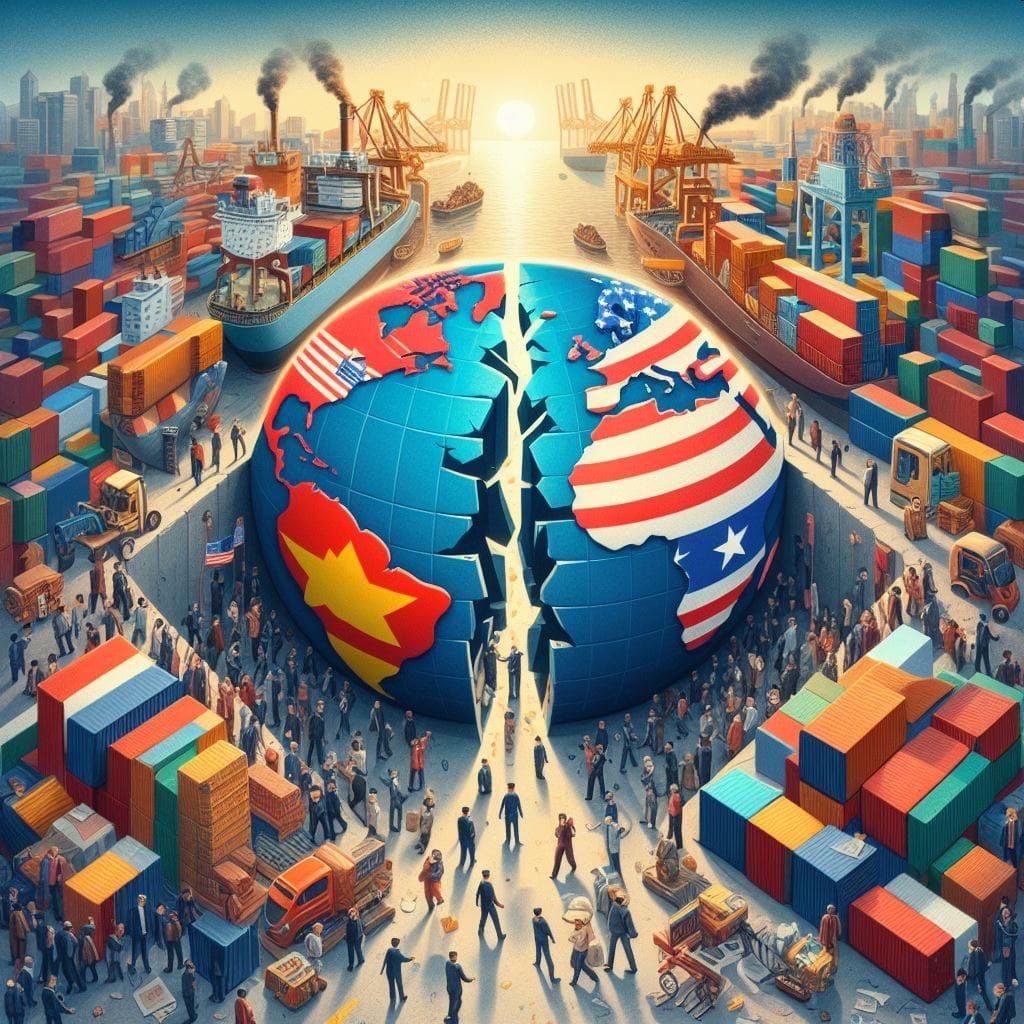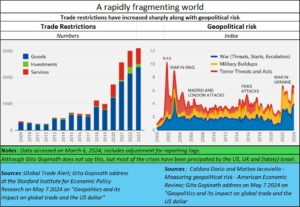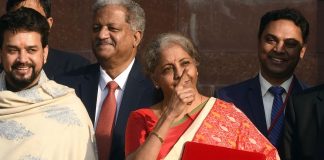India must find new ways to cope with global fragmentation
RN Bhaskar
There is global fragmentation all around. And India has already begun reconsidering many of the policies it had introduced and was quite smug about. Two developments of last week shows how events can take almost everyone by surprise.
First was the announcement that Bangladesh and China would be holding joint naval exercise in the Bay of Bengal. Bangladesh would also purchase defence equipment from China (https://indianexpress.com/article/world/china-bangladesh-army-first-military-exercises-pla-9290652/). Suddenly, India is confronted with the presence of Chinese in Pakistan, in Sri Lanka and now even in Bangladesh. Was Bangladesh driven to the Chinese because it was uncomfortable with the anti-Muslim tirade that Indian politicians (an implicitly politicians from Israel who are supported by the US)? Or is it that Bangladesh saw a greater relevance for the Chinese in this part of the world? One does not know. But with developments in Iran and the rest of the Middle East, the decision taken by Bangladesh cannot be taken lightly.
India finally goes to Iran
The second was India’s decision to set up the Chabahar port in Iran (https://www.reuters.com/world/india/india-sign-10-year-pact-with-iran-chabahar-port-management-et-reports-2024-05-13/) which has been hanging fire since 2003. That was when the then president of Iran — Syed Mohammad entered into a slew of agreements with India. Included among them was the development of Chabahar Port, which could open access to the Persian Gulf, Afghanistan, Central Asia, and Europe.
 In the 21 years since, India has moved closer to the US, and Israel, both of which have been quite hostile towards Iran. Much of the western media has always portrayed Iran as being the belligerent player. It must be noted that much of Western media and financial institutions, including US Universities, are controlled by what John Mearsheimer calls the Israel Lobby (https://www.newstatesman.com/the-weekend-interview/2024/02/john-mearsheimer-israel-ukraine-middle-east).
In the 21 years since, India has moved closer to the US, and Israel, both of which have been quite hostile towards Iran. Much of the western media has always portrayed Iran as being the belligerent player. It must be noted that much of Western media and financial institutions, including US Universities, are controlled by what John Mearsheimer calls the Israel Lobby (https://www.newstatesman.com/the-weekend-interview/2024/02/john-mearsheimer-israel-ukraine-middle-east).
Mearsheimer is today one of the most respected and articulate persons to talk about the geopolitical blunders that the US has made. He is an American political scientist and international relations scholar who belongs to the realist school of thought. He is the R. Wendell Harrison Distinguished Service Professor at the University of Chicago.
Referring to his book “The Israel Lobby” which he wrote in 2007 along with Stephen Walt, he says (https://www.newstatesman.com/the-weekend-interview/2024/02/john-mearsheimer-israel-ukraine-middle-east), “I think we got the story right. The lobby is as powerful as ever. The big difference between when we wrote the book and now is that the lobby’s activities are out in the open today in ways that they weren’t in 2007. I think few people knew much about the lobby back then. And very few people knew much about the lobby’s influence on American foreign policy, especially as it applies to the Middle East. And I think that we helped to expose that, and now more people understand what’s going on. The lobby is now forced to operate much more out in the open.”
In one of his recent talks on 17 May 2024 (https://www.youtube.com/watch?v=kAfIYtpcBxo&t=2000) , before the Centre for Independent studies in Australia, he points out how this Israeli lobby has lately caused anguish for the US, Israelis and even the world. He points out (timeline 1:27:28) how “immediately after October 7th [2024] 500,000 Israelis left the country [Israel]” seeking citizenship with another nation.
The way the lobby has prevailed on the US administration to crush student protests supporting the Palestinians has shocked the world. That it was happening in the US which claims to be democratic, was disturbing. It could lead to wider student protests, larger than the one the world saw against Vietnam. Consequently, Israel is rapidly becoming either an apartheid state, or one bent on ethnic cleansing, says Mearsheimer. Already, it is on the verge of becoming a pariah state.
Iran reasserts itself
Suddenly, Iran has become the most important player in the Middle East.
On April 12/13 Iran sent across 300 missiles and drones to attack Israel. Newspapers say that Israel shot down most of them. But reality, as explained by experts, was a bit different. First, over 200 drones were sent with small payloads, and all were shot down. That allowed Iran to note the places from where the interception was taking place. Then came the cruise missiles which were aimed at those interception sites. Finally came nine ballistic missiles. Of them, five hit Nevatim Airbase in southern Israel — the world’s most heavily fortified airfield. The targets were military assets (https://www.youtube.com/watch?v=07Uev5sdVjU). The intent seemed not to cause damage, but to tell Israel and the world that Iran had the capability to attack any place in Israel, in case of any further provocation. Mearsheimer talks about this in his address before the CIS.
One of the most detailed accounts of what happened was given by Scott Ritter in his video (now inaccessible) at https://www.youtube.com/watch?v=8iHvUH7AVFc. Ritter is an is an American author, former United States Marine Corps intelligence officer, and former UN Special Commission (UNSCOM) weapons inspector.
Another video that talks about why Israel is losing by Pepe Escobar is also inaccessible currently, though it was available at https://www.youtube.com/watch?v=eD4QugB5xLI.
In a way, this was Iran’s first display of military capabilities, and it has vowed to develop nuclear weapons if Israel tried to behave irresponsibly. Similarly, the sanctions imposed by the US against Russia and Iran helped both to get close to China, and the three together have now formed a formidable alliance. The expansion of BRICS to include Brazil, Russia, India, China, South Africa, Iran, Egypt, Ethiopia, and the United Arab Emirates, creates a combine that could easily match the G-7. Geopolitics is no longer the same. The past few months have changed everything.
In many ways the US is to blame. So is the UN, which was quick to call Vladmir Putin a war criminal, even while it looked the other way at Israel’s killings, or worse those by George Bush in Iraq. Though the US claims that only 35,000 people died, surveys by Lancet showed that more than 600,000 died (https://en.wikipedia.org/wiki/Lancet_surveys_of_Iraq_War_casualties). A similar report titled “Study Claims Iraq’s ‘Excess’ Death Toll Has Reached 655,000 by Washington post can be found at https://swap.stanford.edu/was/20100122183142/http://www.washingtonpost.com/wp-dyn/content/article/2006/10/10/AR2006101001442.html. The US disputes this, but has refused to order an independent survey. The UN’s silence on these two instances is damning. That is why many experts believe that the UN will soon become extinct, the way the League of Nations did. The world could even see a new avatar created by the BRICS group. Ditto with the IMF as well.
India’s reassessments
India too is working on ways to discover a new role for itself. By aligning itself with Iran, it has upset both Israel and the US. But it knows that if it does not take up the port in Iran, it too might be taken up by China. The US has threatened sanctions, but it is doubtful if it will actually do so — lest India too might align itself with China. Everything is in a state of flux. All businesses will now have to deal with this uncertainty.
In the meantime Israel has cancelled the work permits of thousands of Palestinian construction workers (https://www.jns.org/thousands-of-palestinians-illegally-entering-pre-1967-israel-daily/). It has been asking India to help replace them with construction workers from this country (https://www.newindianexpress.com/nation/2023/Nov/06/israel-looking-at-hiring-indian-workers-after-cancelling-work-permits-of-palestinians-2630621.html).
But the death of an Indian army officer in Rafah (https://www.thehindu.com/news/national/indian-staff-member-with-the-united-nations-killed-in-gaza/article68173486.ece) working with the UN Department of Safety and Security (UNDSS), and the revulsion over the mass killings in Gaza (the international community calls this genocide), have made many trade unions slam the moves of Israel trying to recruit Indian workers (https://www.telegraphindia.com/world/at-the-expense-of-palestinian-working-class-israel-hiring-of-indian-workers-slammed/cid/2005439). They have also said that they will not handle any ships which carry arms to Israel (https://www.hindustantimes.com/videos/news/indian-trade-unions-anti-israel-move-wont-handle-ships-carrying-weapons-to-tel-aviv-gaza-101708306729681.html). That could affect the Adani group’s plans to push up exports of military hardware to Israel. Just last week, Spain turned away a ship bound with arms for Israel.
Most Middle Eastern countries have stopped dealing with Israel – Jordon was the only exception to allow the US to use its airbases to shoot down Iranian drones and missiles. Turkey has formally banned any trade with that country (https://www.timesofisrael.com/turkeys-sudden-ban-on-trade-with-israel-is-already-affecting-jews-in-both-countries/), pushing up prices in Israel. Effectively, the big plans India, Saudi Arabia, Israel and USA had of creating a new trade corridor (https://asiaconverge.com/2023/09/india-me-europe-economic-corridor-smell-the-coffee/) have been abandoned. Israel is rapidly losing friends, business, and even respectability.
The current political establishment in India and Israel used to take comfort in each other’s company. Both disliked the Islamic world. Now with Iran becoming a key player, Bangladesh looking to China, and the rest of the Islamic world joining hands, India may have to reassess its own political strategies.
But then the US has always been a spoiler in global affairs – especially after it became the hegemon after the near collapse of Russia. Now that hegemony is being challenged. Russia has revived and China too is a global player. The US does not like it. But, obviously, much of the world does.
Few in the world recall how the US and the UK conspired to fund an insurrection in Iran to overthrow a popular and democratically elected leader in the 1950s (https://asiaconverge.com/2018/07/oil-at-usd250-india-iran-usa/). Both countries then decided to instal a pro-US leader in Iran, the Shah (Reza Pahlavi). He could have continued in power, despite a restive public not too fond of the excessive tilt towards the US. But the US arrogantly compelled the Shah to sign what is darkly remembered in Iran as the “capitulation clause” (https://asiaconverge.com/2015/03/762affordable-housing-what-india-can-learn-from-iran/). That brought in Ayatollah Ruhollah Musavi Khomeini as the first supreme leader of the Islamic Republic of Iran.
After 1990, when Russia was on the verge of a complete collapse, the US became the hegemon. It could afford to be capricious. It waged the two Iraq wars, and imposed sanctions against Iran, which the EU repudiated (the EU had a more enlightened leadership then). But in the face of US hegemony, everyone fell in line. So did India. The Iran Chabahar project was shelved.
Iran too might have collapsed but for two factors. First, Iran used some deft policies like the meherbani scheme which gave money into the hands of every child till it attained maturity, and it built affordable houses (see above link) which created aspirations and jobs. Focus on education and social welfare helped.
The economic bailout for Iran came from China which agreed to buy its oil and provide it with some sorely needed foreign exchange. China was then an ally of the US, as seen as a foil to Russia.
Interestingly, few people know that the US actually prevented Russia from becoming a democracy. In an interview on YouTube (https://www.youtube.com/watch?v=Ptaya7stymw) Jeffrey Sachs explains (from timeline 02:55 to 8:36) how the US did everything to prevent Russia becoming a democracy. And when Russia was on its knees and the US and the UK were ready to pick up the pieces and mining contracts, Putin arrived and rebuilt Russia. Today, the US sanctions have only strengthened Russia, both militarily and economically. Russia is more formidable than it was in 1990)see https://asiaconverge.com/2022/06/russia-india-china-should-work-together/ and https://asiaconverge.com/2022/04/the-us-gambit-is-scorching-the-world/).
The list of regime changes the US has been involved in is very long (https://asiaconverge.com/2022/02/ukraine-the-war-that-usa-wants/) and the events that led to the Ukraine war were entirely the machinations of the US, UK and NATO (https://asiaconverge.com/2022/07/the-ukraine-usa-nato-russia-papers/) (aided by a European leadership which did not have the spine to stand up to them).
Will the fragments coalesce?
Today, China, Russia and Iran have forged an alliance. Ukraine is on its last legs as predicted (https://asiaconverge.com/2022/07/the-ukraine-usa-nato-russia-papers/).The US is being bled by both the Ukraine and the Israel conflicts. The world has become a strange place. The US which talked about a rules-based society now opts for unilateral sanctions and vetoes resolutions in the UN against Israel. China has become the biggest advocate of free trade. The US talks of war, while China talks of peace. India and Indian business will have to decide whether it wants to be on the losing side or the winning side.
End of Part I. Part II appears next week.
Do view my podcast (in English) on solar power at https://youtu.be/04g7l3RxBVQ?si=nHLHA9EYaPdeP1JZ








































COMMENTS